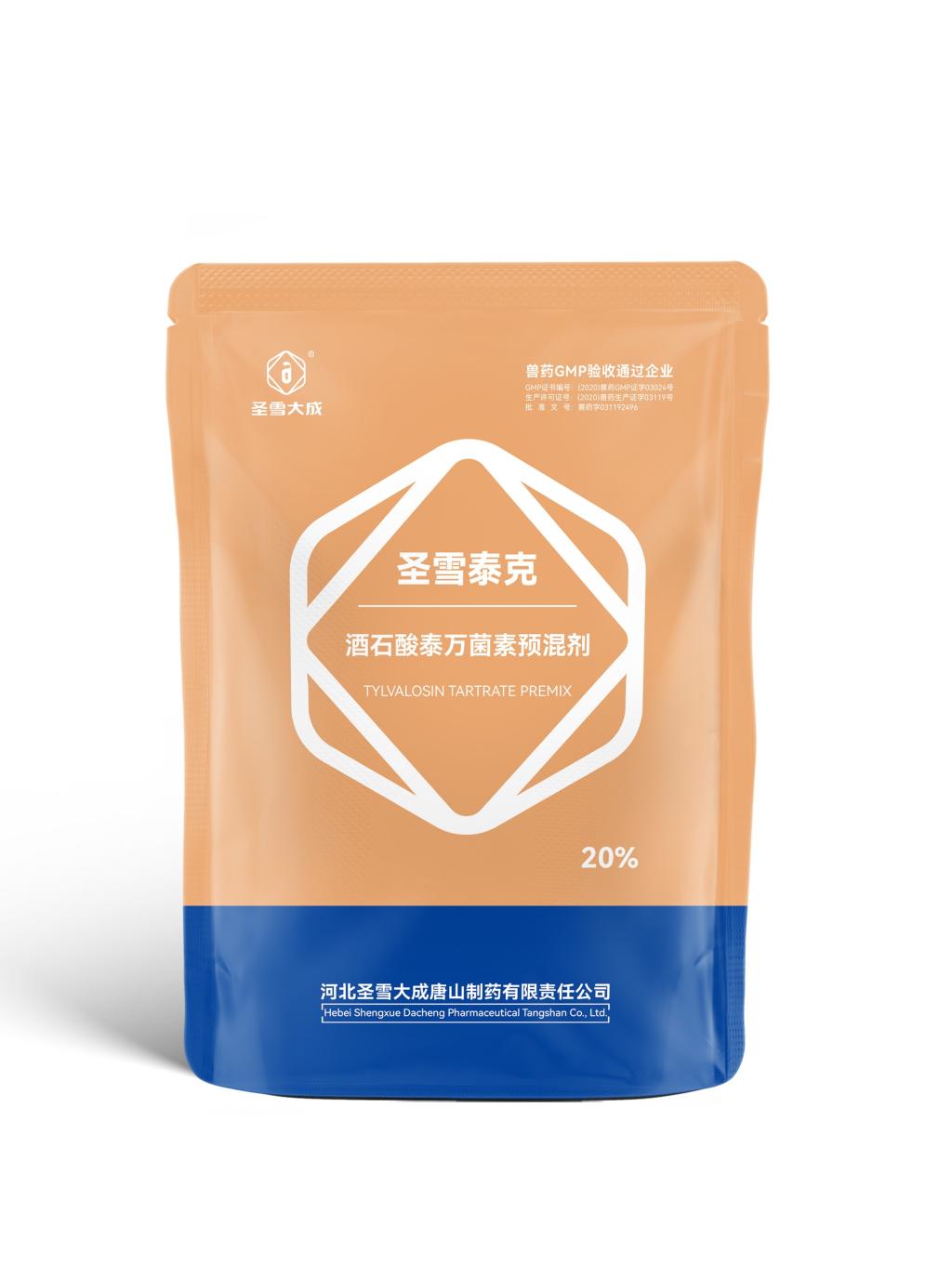
 CONTACT
CONTACT
- Linkman:Linda Yao
- Tel: +8618231198596
- Email:linda.yao@dcpharma.cn
- Linkman:CHARLES.WANG
- Department:Overseas
- Tel: 0086 0311-85537378 0086 0311-85539701
Tylvalosin tartrate premix is a crucial tool in veterinary medicine.
TIME:2024-07-11
Tylvalosin tartrate is a macrolide antibiotic belonging to the pleuromutilin class, known for its efficacy against Gram-positive bacteria, mycoplasmas, and some Gram-negative bacteria. The premix formulation involves blending Tylvalosin tartrate with feed ingredients, ensuring precise dosing and uniform distribution within animal feed. This method facilitates convenient administration to large numbers of animals, making it an integral part of disease prevention and treatment strategies in veterinary medicine.
Mechanisms of Action
The effectiveness of Tylvalosin tartrate stems from its ability to inhibit bacterial protein synthesis through binding to the 50S ribosomal subunit. This mechanism disrupts bacterial growth and replication, thereby combating infections caused by susceptible pathogens. Unlike some antibiotics, Tylvalosin tartrate exhibits minimal cross-resistance with other antimicrobial classes, enhancing its utility in treating infections that may be resistant to alternative therapies.
Therapeutic Benefits
Disease Prevention: In intensive farming operations such as poultry and swine production, Tylvalosin tartrate premix plays a crucial role in disease prevention. It is particularly effective against respiratory diseases and mycoplasmal infections, which can cause significant economic losses due to reduced growth rates, increased mortality, and treatment costs.
Treatment of Clinical Infections: Beyond prevention, Tylvalosin tartrate is used therapeutically to treat clinical infections in livestock. Its rapid absorption and distribution ensure prompt action against bacterial pathogens, aiding in the recovery and health restoration of affected animals.
Improved Growth Performance: Studies have shown that Tylvalosin tartrate premix can improve growth performance in animals. By reducing the incidence and severity of infections, it allows for better nutrient utilization and energy allocation towards growth, resulting in enhanced feed conversion ratios and increased productivity.
Practical Applications in Veterinary Medicine
Tylvalosin tartrate premix finds wide-ranging applications in veterinary medicine:
Poultry Farming: In broiler and layer operations, where respiratory diseases like chronic respiratory disease (CRD) and infectious sinusitis are prevalent, Tylvalosin tartrate premix is instrumental in maintaining flock health and optimizing production efficiency.
Swine Production: Swine are susceptible to respiratory diseases such as porcine respiratory disease complex (PRDC) and mycoplasmal pneumonia. Tylvalosin tartrate premix is used prophylactically and therapeutically to control these infections, ensuring healthy growth and minimizing disease-related losses.
Aquaculture: The application of Tylvalosin tartrate premix extends to aquaculture, where bacterial infections in fish and shrimp can devastate production. Its effectiveness in treating bacterial diseases underscores its importance in maintaining sustainable aquaculture practices.
Regulatory Considerations and Safety
The use of Tylvalosin tartrate premix in veterinary medicine is subject to stringent regulatory oversight to ensure safety for animals, consumers, and the environment. Regulatory agencies evaluate factors such as product efficacy, safety profiles, residue levels in animal products, and potential impacts on human health and the ecosystem. Compliance with these regulations is essential for maintaining public trust and market access for agricultural products.
Ongoing Research and Innovations
Research into Tylvalosin tartrate premix continues to evolve, focusing on several key areas:
Resistance Management: Strategies to mitigate antimicrobial resistance are a priority. Research aims to optimize dosing regimens, explore combination therapies, and develop alternatives to reduce the development of resistant bacterial strains.
Impact on Gut Microbiota: Studies investigate the effects of Tylvalosin tartrate on the gut microbiota of treated animals. Maintaining a balanced microbiome is critical for digestive health, immune function, and overall animal well-being.
Environmental Impact: Efforts are underway to minimize the environmental impact of veterinary pharmaceuticals. Research explores innovative waste management practices and technologies to mitigate the release of Tylvalosin tartrate into the environment.
Challenges and Considerations
While Tylvalosin tartrate premix offers significant benefits, challenges persist:
Public Perception: Consumer awareness and perceptions of antibiotic use in agriculture influence regulatory policies and market demands. Transparent communication and adherence to stewardship principles are essential for addressing public concerns.
Global Accessibility: Ensuring equitable access to Tylvalosin tartrate premix, particularly in developing countries, remains a challenge. Efforts to promote sustainable use and affordability are critical for global food security.
Future Perspectives
The future of Tylvalosin tartrate premix in veterinary medicine hinges on collaborative efforts to advance research, promote responsible use practices, and innovate sustainable solutions. Continued investment in research and development will expand our knowledge base, optimize therapeutic outcomes, and ensure the long-term efficacy of this vital tool in animal health management.
Conclusion
In conclusion, Tylvalosin tartrate premix is indispensable in veterinary medicine, contributing to disease prevention, treatment efficacy, and enhanced productivity in livestock and aquaculture. As research progresses and regulatory frameworks evolve, the responsible use of Tylvalosin tartrate premix will remain paramount in sustaining animal health, supporting global food production, and safeguarding public health and environmental integrity.
- Tel:+8618231198596
- Whatsapp:18231198596
- Chat With Skype







